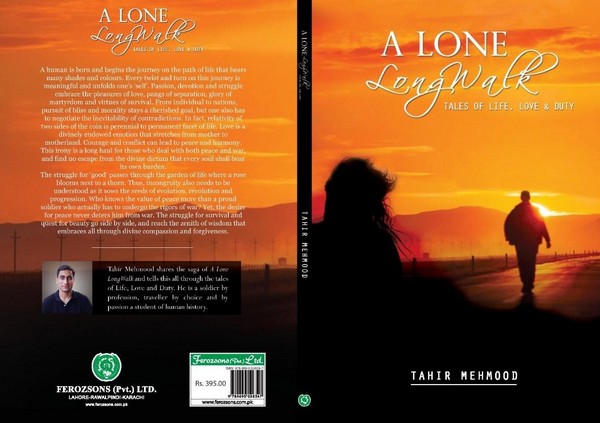Reviewed by Asma Ishaq
Pick up Tahir Mehmood’s book “A Lone Long Walk” and you will enjoy reading it till the last page. The book consists of short stories that the writer wrote over a span of six years – from 2014 to 2019. The 116-page book published by Pakistan’s leading Ferozsons fully serves for the pleasurable-leisure-reading. Like any established story-teller, he chose ‘love’ and ‘life’ as his main subject to write about. However, soldiery, call of duty, mystery, union and separation also range throughout his stories. These stories may also be called a product of his long service years in the military, his strong reading of the human-traits and interactions with fellow humans and subordinates also come visible. The title of the book ‘A Lone Long Walk’ is itself wrapped in the mystery that attracts the reader who believes in the thought that “Life is nothing but a journey to walk all alone”.

Story is a ‘narration’ in one word. Tahir Mehmood successfully uses the literary genre of his ‘gripping narrative’ in writing all these stories, which are mostly written in the third-person account; it is a popular but difficult literary genre where the writer must develop an engaging plot for developing the stories as well as for the reader’s attraction. Usually, such ‘gripping narrations’ are written about the wartime-adventures, love and life, union and separation, and tribute to the Nature. Almost in all his stories, the author brings a ‘moving-narration’ and ‘motivating-impression’ while utilizing all these subjects for the chosen plots. He has maintained it well to catch-hold the reader’s attention to take them to the end. His grip remains firm in narrating the ongoing events of the stories. Moreover, he has tactfully intertwined the events. At one point, these very events become compelling and engrossing for the readers in order to know the end. One must say, it’s a book to be read in one go.
- Motherhood: The Journey of Rediscovering Yourself
- Book Review: Invisible Balance of Power
- Book Review: Moonglade
As the writer has chosen the stories of soldiers in particular, one may trace some glimpses of the Elizabethan Tragedy in these tales. He has tried much better to have written the stories where the ‘hero’ of the story must have to die or to meet a ‘dreadful’ destiny. The stories are melancholic in nature where the hero contributes something really greater to sacrifice. This sacrifice maybe the hero’s ‘life’ or ‘love’ both in pursuit of ‘call of duty’. His stories ‘He Chose to Die’, ‘From Piccadilly to Gatwick’ and ‘The Remains’ are good examples in this regard. Whereas, in couple of stories, it is just the ‘fate’ that brings separation in between the two ‘star-crossed-lovers.’
The expression of the stories is eloquent one, yet somewhere it is esoteric too. Each story shares a good amount of knowledge and wisdom about ‘life’. It’s not wrong to say that the writer’s philosophical interpretation of ‘life’ is similar to that of Khalil Gibran. Tahir Mahmood seems touching all the realms of life – ‘romance’, ‘courage’ and ‘morals’… He has given an intellectual meaning with a guide to decipher the secrets of ‘life’. He has also brought in discussion the dilemmas and miseries of ‘life’ like ‘poverty’, ‘injustice’, ‘violence’ and ‘usurpation’ in a thought-provoking manner.
One added beauty of these stories is the use of literary devices like ‘personification’, ‘metaphors’ and ‘imagery’. Likewise, is the writer’s excellent use of the imaginative skill. The two stories: ‘A Cloud Above the Land’ and ‘A Town Beyond Sorrow’ are an excellent example of the mentioned characteristics. The writer personifies a ‘Cloud’ and ‘Land’ to depict the complexities of the love-relationship in manner of a conversation. The ‘Cloud’ represents a ‘free-lover’ while the ‘Land’ symbolizes a lover seeking comfort in the uninterrupted companionship. The puppeteer and marionette in ‘A Town Beyond Sorrow’ is an amazing conversation about the human evolution. It is about how a human grows from the formative years into a complete functioning mode. This story also points out the challenging phases of a human’s growth; the author metaphorically calls the human a ‘nomad’, a ‘vagabond’ and a ‘traveller’.
‘A Lone Long Walk’ is a treat to the readers who like to read something unique or different line of thought. Justifiable to say, Tahir Mehmood is a welcome addition in the list of prolific writers of our contemporary era. It is a proven-fact that an indigenous writer that he is, is always found effective to bring and discuss the prevalent issues in a constructive manner. Tahir Mahmood has done it well. His main purpose to write these stories is primarily to pass on the ‘knowledge’, ‘wisdom’ and ‘truth’ to fellow humans. His stories are riveting; nevertheless, helpful to understand ‘life’. ‘Love’, ‘Life’, ‘Call of Duty’ are his catch words. His propitious effort must be appreciated for the reason to have received more guiding-books in the future.
- Book: “A Lone Long Walk”
- Author: Tahir Mehmood
- Genre: Short-Stories (Fiction)
- Publisher: Ferozsons (Pvt.) Ltd.
- Publication Year: March-2020
- Pages: 116, Price: Rs 395
